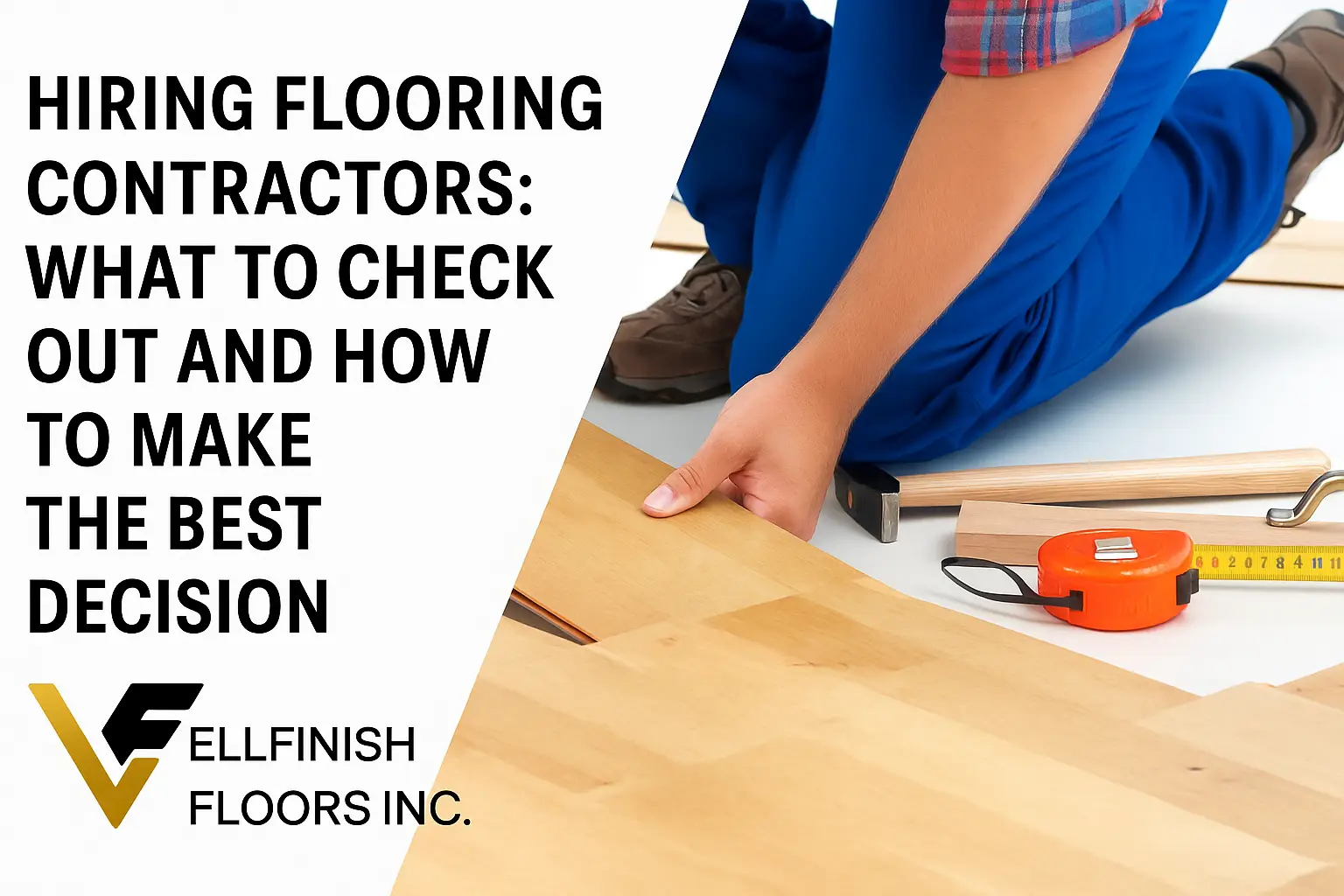Hiring Flooring Contractors: What to Check Out and How to Make the Best Decision

When it comes to renovating or building a home, flooring is one of the most impactful design and functional elements. The right flooring can elevate your interiors, add warmth, and even increase property value. But no matter how high-quality your flooring material is—be it hardwood, laminate, vinyl, or tile—the success of the project ultimately depends on the installation. That’s where hiring the right flooring contractor becomes crucial.
Choosing a contractor is not just about finding someone who can lay floors; it’s about finding a professional who brings skill, reliability, and attention to detail. With so many options available, homeowners often feel overwhelmed. This guide will help you understand what to look for when hiring flooring contractors and how to make the right choice for your project.
Why Hiring the Right Flooring Contractor Matters
Flooring installation might appear easy, but it takes technical skills. Poor installation will lead to uneven floors, gaps, buckling, or excessive wear, costing you later in repairs or replacements. A professional contractor guarantees:
- Accurate and high-quality workmanship
- Compliance with manufacturer instructions (critical for warranties)
- Proper tools and techniques
- On-time project schedules
- A hassle-free experience
Simply put, getting the right contractor protects your investment.
Step 1: Define Your Flooring Needs
Before you even begin looking for contractors, define what you need. Various types of flooring call for different skills. For example:
- Hardwood flooring calls for an understanding of acclimation, subfloor work, and sanding/finishing.
- Vinyl and laminate require accurate cutting, underlayment management, and click-lock system skills.
- Tile flooring calls for leveling, grouting, and sealing expertise.
- Carpet installation includes stretching and seam sealing for lasting durability.
By knowing what you need, you can limit your search to contractors who specialize in your type of flooring.
Step 2: Shortlist Contractors Through Research
Research is necessary in finding the perfect contractor. This is where to begin:
- Get referrals from neighbors, friends, or relatives who recently installed flooring.
- Check online directories such as Houzz, HomeStars, or Angi.
- Check Google and Yelp reviews to gauge reputation.
- Visit local flooring stores—many have reliable contractors they work with.
Make a shortlist of not less than three contractors for comparison.
Step 3: Verify Credentials and Licensing
A good flooring contractor should possess the appropriate credentials. Always check:
- Licensing – Whether they’re licensed within your area to install flooring.
- Insurance – Whether they have liability and worker’s compensation coverage. This covers you for liabilities in the event of accidents or damage.
- Certifications – There are some contractors with certifications from manufacturers or professional associations, indicating they are qualified in particular flooring products.
It’s risky to hire a person without the right credentials, even if they are well recommended.
Step 4: Inspect Experience and Previous Work
Experience can be the difference between a perfect floor and a maddening redo. Ask:
- How long have they been in business?
- Do they work with your desired type of flooring?
- Can they show you before-and-after shots or a portfolio?
- Do they have references from previous customers you can contact?
Looking at their previous work allows you to determine their skill and consistency.
Step 5: Ask the Right Questions
Don’t be afraid to ask questions when interviewing contractors. The more you know, the better decision you’ll make. Some of the key questions are:
- What type of flooring jobs do you specialize in?
- What steps do you take to prepare the subfloor prior to installation?
- What is an approximate project timeline?
- Do you provide a warranty on installation?
- Who will be doing the job—your staff or subcontractors?
- How do you deal with unforeseen problems, like subfloor damage?
- What payment terms do you need?
A professional contractor will reply clearly and reassuringly.
Step 6: Compare Estimates
Ask your shortlisted contractors for written estimates. A good estimate should cover:
- Cost of materials (if they are providing them)
- Labor costs
- Cost of subfloor preparation
- Fees for waste removal or cleanup
- Warranty information
Be cautious of rock-bottom bids. Saving money is attractive, but low-ball estimates may result in low-quality work or unexpected fees down the road. Opt instead for a balance of good price and value.
Step 7: Look Over Contracts Thoroughly
Never work without a written contract. A contract should include:
- Scope of work
- Materials that will be used
- Timeline for completion
- Payment schedule
- Terms of warranty
- Process for resolving conflicts
Clear contracts guard both you and the contractor against misunderstandings.
Step 8: Pay Attention to Communication
Effective communication is underemphasized but essential. A professional contractor will:
- Answer calls and messages in a timely manner
- Explain process and expectations clearly
- Stay you informed about progress
- Respectfully address concerns
If communication is off prior to contract signing, don’t expect it to improve during the project.
Step 9: Check for Warranties and Guarantees
- A good flooring contractor will back their work. Look for:
- Manufacturer’s warranty – Covers material defects.
- Installation guarantee – Guarantees workmanship defects such as uneven seams or lifting boards.
- Both provide peace of mind that your investment is secure.
Step 10: Look Beyond Price
Price matters, but don’t make it the sole consideration. Look at:
- Experience level
- Materials used to quality
- Warranty provided
- Reviews and reputation
Communication and professionalism
- The lowest price may cost you more down the road.
- Common Mistakes to Avoid When Hiring Flooring Contractors
- To avoid a seamless process, avoid these common pitfalls:
- Not doing enough research on contractors – Always compare three at least.
- Selecting solely on price – Quality is most important.
- Omitting details in the contract – Always have everything in writing.
- Not verifying references – Former client experience tells you a lot.
- Neglecting insurance – You may be responsible for accidents otherwise.
Red Flags to Watch Out For
Be wary if a contractor:
- Presses you to sign rapidly without providing information
- Won’t give you references or insurance proof
- Requires huge deposits upfront
- Has largely negative reviews
Provides incomplete or unclear estimates
- Trust your gut—if something doesn’t smell right, keep looking.
- Advantages of Employing the Proper Flooring Contractor
- When you choose a qualified and reliable contractor, you benefit from:
- Increased confidence in the job being done correctly
- Time savings, because professionals do things the right way
- Increased longevity of your flooring
Greater property value through quality installation
- Easy experience with less to go wrong
- In the end, you’re not merely paying for installation—you’re investing in comfort, beauty, and lasting value.
- Last Thoughts on How to Make the Best Decision
- Do your research – Research thoroughly before signing on the dotted line.
- Trust your instincts – Professionalism and dependability are as crucial as talent.
- Emphasize value, not price – The correct contractor pays you back over time.
- Put it in writing – Warranties and contracts are your insurance policy.
Conclusion
Hiring Flooring Contractors is one of the biggest decisions you’ll make when you’re remodeling a home or building one. An expert professional not only guarantees perfect installation but also safeguards your investment, minimizes stress, and provides you with confidence in the end product.
By adhering to the steps listed here—identifying your needs, researching, verifying credentials, asking questions, and reading contracts—you can steer clear of expensive missteps and have gorgeous, enduring floors. Don’t forget, the lowest bid isn’t always the best deal; seek out a contractor who provides the best combination of quality, professionalism, and value.
Your home deserves the best foundation, and with the right flooring contractor, you’ll enjoy stylish, durable floors for years to come.


